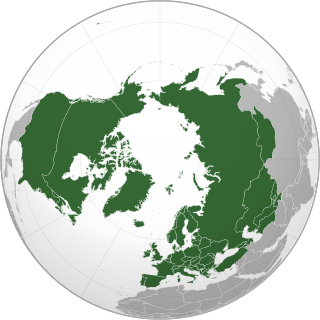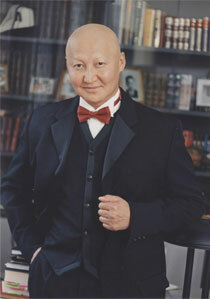
The history of the Kyrgyz people and the land now called Kyrgyzstan goes back more than 2,000 years. Although geographically isolated by its mountainous location, it had an important role as part of the historical Silk Road trade route. In between periods of self-government it was ruled by Göktürks, the Uyghur Empire, and the Khitan people, before being conquered by the Mongols in the 13th century; subsequently it regained independence but was invaded by Kalmyks, Manchus and Uzbeks. In 1876 it became part of the Russian Empire, remaining in the USSR as the Kirghiz Soviet Socialist Republic after the Russian Revolution. Following Mikhael Gorbachev's democratic reforms in the USSR, in 1990 pro-independence candidate Askar Akayev was elected president of the SSR. On 31 August 1991, Kyrgyzstan declared independence from Moscow, and a democratic government was subsequently established.

The Politics of Kyrgyzstan, officially known as the Kyrgyz Republic takes place in the framework of a parliamentary representative democratic republic, whereby the President is head of state and the Prime Minister of Kyrgyzstan is head of government. Executive power is exercised by the government. Legislative power is vested in both the government and parliament. The Economist Intelligence Unit has rated Kyrgyzstan as "hybrid regime" in 2016.

Parliamentary elections were held in Kyrgyzstan on 27 February and 13 March 2005. The belief that the elections had been rigged by the government led to widespread protests, culminating in the Tulip Revolution on 24 March in which President Askar Akayev was overthrown.

The Tulip Revolution or First Kyrgyz Revolution led to President of Kyrgyzstan, Askar Akayev's fall from power. The revolution began after parliamentary elections on February 27 and March 13, 2005. The revolutionaries alleged corruption and authoritarianism by Akayev, his family and supporters. Akayev fled to Kazakhstan and then to Russia. On April 4, 2005, at the Kyrgyz embassy in Moscow, Akayev signed his resignation statement in the presence of a Kyrgyz parliamentary delegation. The resignation was ratified by the Kyrgyz interim parliament on April 11, 2005.
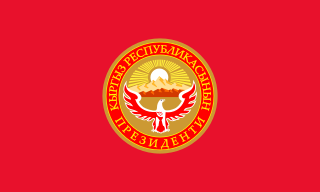
The President of Kyrgyzstan is the head of state and the highest official of the Kyrgyz Republic. The president, according to the constitution, "is the symbol of the unity of people and state power, and is the guarantor of the Constitution of the Kyrgyz Republic, and of an individual and citizen." The president is directly elected for no more than one six-year term by the Kyrgyz electorate. The office of president was established in 1990 replacing the Chairman of the Supreme Soviet that existed, in different forms, from 1927 whilst the country was known as the Kirghiz Soviet Socialist Republic.

Felix Sharshenbayevich Kulov is a Kyrgyz politician who was Prime Minister of Kyrgyzstan from 2005 to 2007, following the Tulip Revolution. He first served from 1 September 2005 until he resigned on 19 December 2006. President Kurmanbek Bakiyev reappointed him acting Prime Minister the same day, but parliamentary opposition meant Bakiyev's attempts to renominate Kulov in January 2007 were unsuccessful and on 29 January the assembly's members approved a replacement. Kulov cofounded and leads Ar-Namys, a political party, and chairs the People's Congress, an electoral alliance to which Ar-Namys belongs.

Kyrgyzstan held a presidential election on 10 July 2005. It saw a landslide victory for acting President Kurmanbek Bakiev, marking the end of his interim government formed after the previous president, Askar Akayev, was overthrown in the revolution in March 2005.

The Constitution of Kyrgyzstan is the supreme law of the Kyrgyz Republic. The constitution in force until 2010 was passed by referendum on 21 October 2007 and it is based on the first post-Soviet constitution originally adopted on 5 May 1993, a year and a half after the country had gained independence from the former Soviet Union. The 1993 constitution had been amended several times: first on 10 February 1996, then on 2 February 2003, and finally twice in quick succession on 9 November 2006 and 15 January 2007 after the Tulip Revolution of March 2005. The last two amendments were adopted under pressure from protracted public protests in the capital Bishkek, but they were annulled in September 2007 by the Constitutional Court, which restored the 2003 constitution and paved the way for another constitutional referendum in October 2007. The description that follows is based on the text of the October 2007 constitution.
Azim Beishembayevich Isabekov born 4 April 1960) served as the Prime Minister of Kyrgyzstan from 29 January until 29 March 2007.

Early parliamentary elections were held in Kyrgyzstan on 16 December 2007. The election was called by President Kurmanbek Bakiyev after the constitutional referendum on 21 October 2007 approved a new electoral system and constitutional reform proposals, enlarging the parliament to 90 MPs and introducing party-list voting.
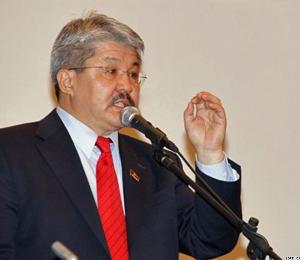
Bakyt Beshimov is a leader of parliamentary fraction and deputy chairman of Social Democratic Party of Kyrgyzstan. Bakyt Beshimov is a prominent opposition leader, famous for his liberal views, and speaking out against Kurmanbek Bakiyev's and Askar Akayev's regimes.

Early presidential elections were held in Kyrgyzstan on 30 October 2011 to replace Interim President Roza Otunbayeva. Former Prime Minister Almazbek Atambayev of the Social Democratic Party of Kyrgyzstan won in the first round.
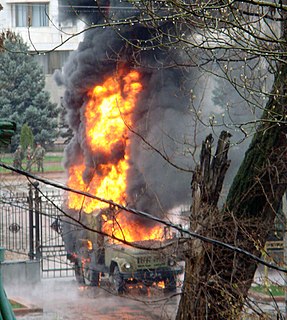
The Kyrgyz Revolution of 2010, also known as the Second Kyrgyz Revolution, the April Events or officially as the People's April Revolution, began in April 2010 with the ousting of Kyrgyz president Kurmanbek Bakiyev in the capital Bishkek. It was followed by increased ethnic tension involving Kyrgyz people and Uzbeks in the south of the country, which escalated in June 2010. The violence ultimately led to the consolidation of a new parliamentary system in Kyrgyzstan.

The current constitution of Kyrgyzstan was passed by referendum on June 27, 2010, replacing the previous constitution. It introduced a strong parliament to the country, reducing the power of the historically strong president. The constitution is similar in many ways to the previous one.

Presidential elections were held in Kyrgyzstan on 15 October 2017. Incumbent President Almazbek Atambayev was not allowed to run again because the constitution sets a single six-year term for the head of state. Eleven candidates registered for the race, and from this field Sooronbay Jeenbekov of the Social Democratic Party of Kyrgyzstan won more than 50% of the vote, avoiding a runoff. Following certification of the results on 30 October, Jeenbekov was inaugurated as President of Kyrgyzstan on 24 November. The election, though not without flaws, was Central Asia’s first ever truly competitive election.





